It's all about the classical music composers and their works from the last 400 years and much more about music. Hier erfahren Sie alles über die klassischen Komponisten und ihre Meisterwerke der letzten vierhundert Jahre und vieles mehr über Klassische Musik.
Total Pageviews
Monday, August 8, 2022
"SCHINDLER'S LIST" IN THE LARGEST EUROPEAN SYNAGOGUE: XAVER VARNUS & CS...
Morricone conducts Morricone: The Mission (Gabriel's Oboe)
「めぐり逢い An Affair To Remember」サウンド・トラック Sound Track
Sunday, August 7, 2022
Mantovani - his music and his life
Friday, August 5, 2022
Four Phantoms Medley ft. Sarah Brightman | The Phantom of The Opera
Can't Take My Eyes Off You (Stunnig Gimnazija Kranj Symphony Orchestra)
Joys and Sorrows of Outdoor Concerts
by Janet Horvath, Interlude
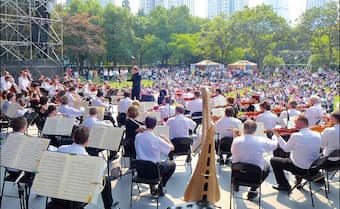
The Prague Symphony Orchestra outdoor performance © cleveland.com
Ah! It’s finally summer festival and outdoor concert time. Families love to picnic while orchestras play in various outdoor venues.
The audiences come to our outdoor performances in droves. They are excited to introduce the orchestra to their children where they can run around freely and dance to the music waving their little arms conducting as it were. I can remember the joys and sorrows of playing outside. Either it was extremely hot with humidity that caused the fingerboard of one of our cellos to melt off, or so cold that we were reduced to wearing mittens with the fingertips cut off! We would often set up right on the grass with barely a shell behind us, exposed to the sun, rain and wind. We had long clothespins to hold the music down and I was the lunger — I’d unclip the page and whip it over while my stand-partner continued playing. Then he would leap up to clip the newly turned page on the left side of the stand — teamwork to say the least. We were ok as long as the stands didn’t blow over as well! Our survival kit had to include the clothespins, sunglasses, cloths to protect our instruments from direct sun, bug spray, seat cushions for the hard folding chairs, a white jacket if it was cold which one could whip off if it was hot, sunscreen, and water bottles.
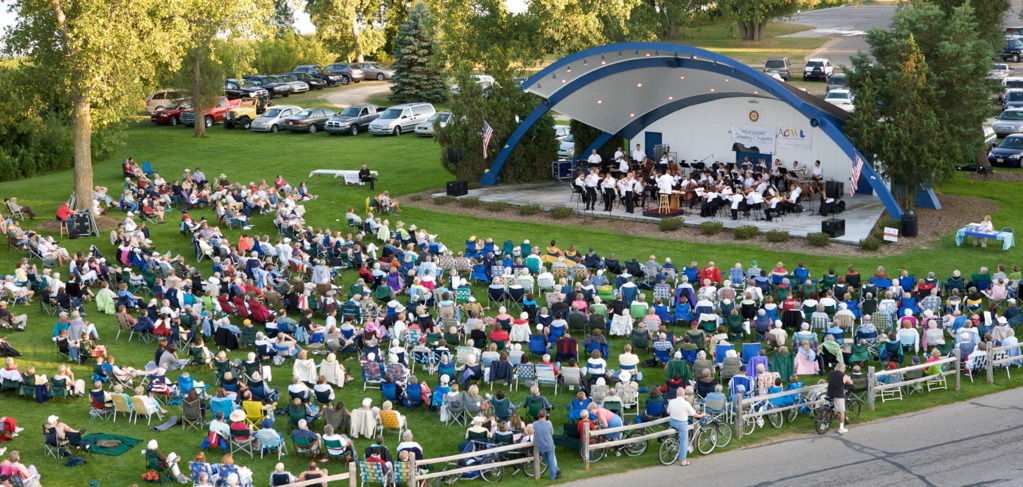 One summer black and green thick clouds rolled in and sure enough torrential rains engulfed us. With only one canvas bass case among the 10 players, the bass players took turns rushing each bass to the wooden trunks, which were several feet away behind the meager shell.
One summer black and green thick clouds rolled in and sure enough torrential rains engulfed us. With only one canvas bass case among the 10 players, the bass players took turns rushing each bass to the wooden trunks, which were several feet away behind the meager shell.
Another summer when I was principal cello I performed the famous cello solo in Poet and Peasant Overture, by Franz von Suppé, which I thought I did famously even on my “outdoor” cello. Evidently, a bird thought otherwise and dropped one on my cello. Editorial comment no doubt.
Franz von Suppé: Dichter und Bauer (Poet and Peasant): Overture (London Philharmonic Orchestra; Neville Marriner, cond.)
No concert was complete without Tchaikovsky’s 1812 Overture, and since it was outdoors we used real cannons. One year we played sitting on hay bales in an open field. Everyone was happy but the cows. They were terrified by the noise.
We and many other orchestras always finish with the encore The Stars and Stripes Forever, the famous march of America’s “March King” John Philip Sousa, which always gets the audience clapping in rhythm.
John Philip Sousa: The Stars and Stripes Forever (Royal Artillery Band; Keith Brion, cond.)
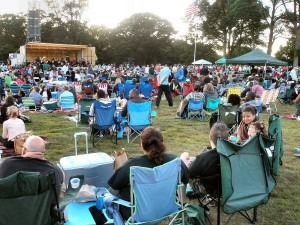 As a child Sousa attended band rehearsals with his father. His heartfelt ambition was to play with the local circus band but his parents disapproved so vigorously that he became an apprentice musician with the Marine Band. At the tender age of twenty-six he became the Band’s director. During his tenure Sousa expanded the Band’s repertoire with not only the work of Tchaikovsky, Verdi, Wagner and others — Europe’s then contemporary composers — but his own compositions such as President Garfield’s Inauguration March, Semper Fidelis, and The Washington Post. Sousa was extremely popular so much so that he left the Marine Band to start his own band in 1892.
As a child Sousa attended band rehearsals with his father. His heartfelt ambition was to play with the local circus band but his parents disapproved so vigorously that he became an apprentice musician with the Marine Band. At the tender age of twenty-six he became the Band’s director. During his tenure Sousa expanded the Band’s repertoire with not only the work of Tchaikovsky, Verdi, Wagner and others — Europe’s then contemporary composers — but his own compositions such as President Garfield’s Inauguration March, Semper Fidelis, and The Washington Post. Sousa was extremely popular so much so that he left the Marine Band to start his own band in 1892.
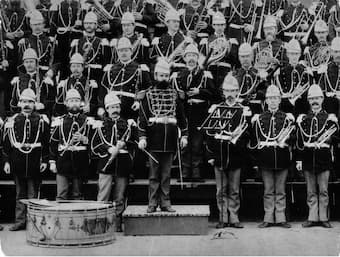
The USA Marine Band with conductor John Philip Sousa © Keystone/Getty Images
While on vacation in Europe four years later, Sousa received word that his band manager, David Blakely, a good friend, had died. Sousa immediately sailed back to the States. The music of The Stars and Stripes Forever began to come to him. Sousa wrote: ” …absorbed in thoughts of my manager’s death and the many duties and decisions which awaited me in New York, suddenly, I began to sense a rhythmic beat of a band playing within my brain. Throughout the whole tense voyage, that imaginary band continued to unfold the same themes, echoing and re-echoing the most distant melody. I did not transfer a note of that music to paper while I was on the steamer, but when we reached shore, I set down the measures that my brain-band had been playing for me, and not a note of it has ever changed.” Sousa’s Band played the march at almost every concert it held after that. Interestingly, Sousa set words to it, but it is rarely performed that way.

© The Bow and Baton
Usually our outdoor concerts were scheduled to coincide with late summer sunsets for the fireworks displays. The stage managers erected great big tall lights so we could see our music. Sure enough, as soon as it became dark, out came the insects. We could see them swarming around the lights and descending on us juicy unsuspecting victims. We couldn’t stop playing to swat a mosquito that had landed on us in the middle of Tchaikovsky! Sometimes we would have the opportunity in a bar or two of rest to hit a couple of them with our bows while they crawled on our music. One year a child came running up to the stage to spray bug repellant on our exposed ankles while we continued our playing and flailing.
Despite years of promises from the sponsors, as soon as the fireworks trigger person heard The Stars and Stripes Forever he invariably launched the fireworks, usually right behind the orchestra shell. We hurried frantically to pack up our instruments while cinders landed on us. The noise of course was deafening both from the booms and the ooohs and aahhhs of the crowds.
Some festivals have fancy facilities like Tanglewood in Massachusetts, home of the Boston Symphony, where there is a permanent stage and benches for seating the audience. The orchestra has air conditioning blowing up from the floor and a roof over their heads, good chairs and lighting, and a backstage. Audiences can purchase picnic baskets filled with everything one would want for dinner including wine! Santa Fe Opera is a state-of-the-art outdoor facility too as is the Aspen Festival. In Europe there are many festivals some with indoor facilities. The famous Verbier Festival’s main hall The Salle des Combins seats 1700. Each row is on a separate tier, which guarantees and excellent view of the stage. Improvements to the soundproofing and heat insulation make this a very high quality non-permanent venue. Others include Flanderies Musicales de Reims, and Granada International Festival of Music and Dance and many others (you can check on the festivals section for more information.)
Next summer we look forward to the throngs who love hearing the orchestra outside and in!
When the Hero isn’t Quite Heroic
The Clueless Heroes in Classical Operas
Throughout most of the opera, there are certain tropes that repeat and repeat: the heroine will die of some wasting disease (La Bohéme, La Traviata, etc.), the hero will save the day (Die Zauberflöte), and so on. There are some operas, however, where it’s the idiot or the simpleton who saves the day.
Richard Strauss: Guntram
In Richard Strauss’ unsuccessful opera Guntram, our title character is a minstrel. He first dissuades duchess Freihild from drowning herself. He then goes to her husband, Duke Robert, a grasping tyrant, and sings a song to peace and generous rulers, which doesn’t go over very well, and then urges rebellion against the duke. The duke attacks our minstrel, who turns out to be a knight-minstrel and slays the duke. While imprisoned, Guntram realizes that, although he spoke of liberation, he was really acting out of love for Freihild. He decides that in atonement, he will spend the rest of his life in solitude, while gazing upon the benevolent reign of Freihild.
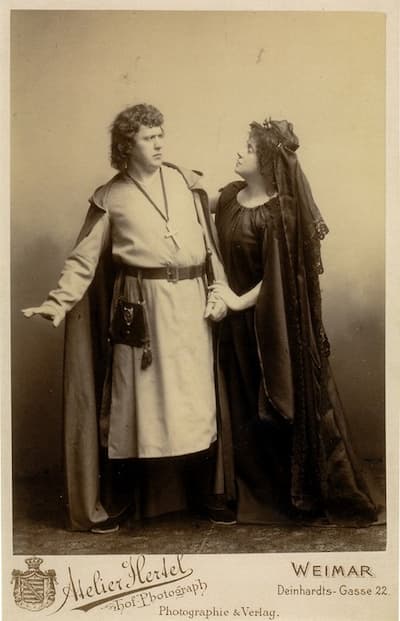
Guntram (Heinrich Zeller) and Freihild (Pauline de Ahna), 1894, Weimar
Richard Wagner: Siegfried
This is Strauss at his most Wagnerian, and the minstrel (perhaps standing in for the composer) was an unusual hero for an opera. However, if we look at Wagner, we have another idiot hero. Siegfried is a boy from the forest. Raised by Mime the dwarf, Siegfried despises his foster father and declares that he only stays until Mime tells him about his childhood. Mime tells him about Sieglinde and Siegmund and how Sieglinde died giving birth to Siegfried. Only Siegfried, the ‘one who knows no fear,’ can forge the great sword Nothung and after slicing Mime’s anvil in half, goes off to fight Fafner, the dragon left over from the first Ring opera.
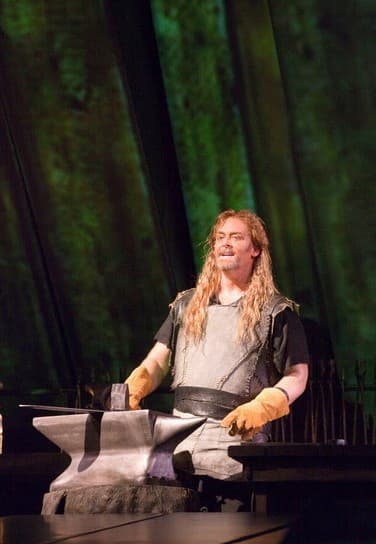
Jay Hunter Morris as Siegfried (Metropolitan Opera)
Siegfried, raised only by Mime, is such an innocent that when he gets to his pre-destined role in this opera, rescuing Brünnhilde from the ring of fire her father has imprisoned her in, that he unwittingly utters the funniest line in the entire Ring cycle: “Das ist kein Mann!” (That is no man!), as he removes her armour. He’s one of the rare slices first, ask questions later opera heroes.
Modest Mussorgsky: Boris Godunov
The opera Boris Godunov has a character called a ‘yuródivïy,’ i.e., a fool for Christ. These Holy Fools act intentionally foolish, to ‘conceal their perfection from the world.’ The yuródivïy appears in Act IV, chased by children and singing a nonsense song. As the Pretender readies himself for his march on Boris, the yuródivïy sings a song predicting the difficulties that the country will soon face (Flow, flow, bitter tears!).
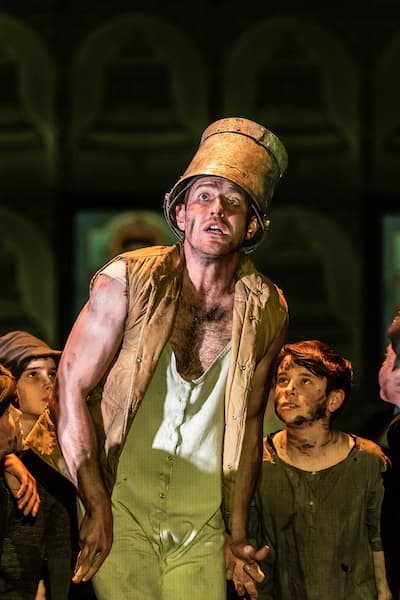
Sam Furness as the Holy Fool in Boris Godunov, 2019 (The Royal Opera) (Photo by Clive Barda)
Wolfgang Amadeus Mozart: Die Zauberflöte
In Mozart’s Die Zauberflöte, we have the unique character of Papageno. A bird-catcher by profession, he’s seemingly half-bird himself.

Emanuel Schikaneder, librettist of Die Zauberflöte, shown performing in the role of Papageno as shown in the first edition of the libretto
He’s not above lying to Tamino about how he killed the fearsome serpent, but when he’s pressed into service for our hero, he’s the first one to actually discover the kidnapped Pamina. Through the trial sequence, despite being told over and over to be silent, he can’t keep still. Banished from the test, he is saved by the appearance of his own half-bird woman, Papagena. We know that Tamino and Pamina will have a difficult intellectual life but that the two simpletons, Papagena and Papageno are only intending to have many, many, many children.
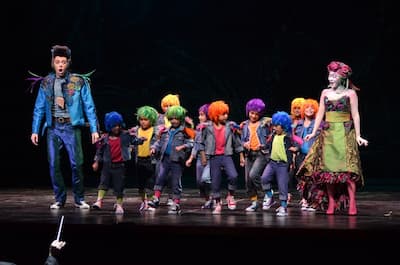
Papageno (Jonathan Michie) and Papagena (Hye-Jung Lee) and children (Florida Grand Opera)
Giuseppe Verdi: Falstaff
We could also consider Verdi’s Falstaff as the idiot hero – used to a life of pleasure when he hung around with Prince Hal, he’s no longer the center stage when Hal becomes King Henry. His attempts to seduce women end with him being thrown in the river with the laundry and his forest appearance as the ghost of Herne the Hunter, complete with stag horns.
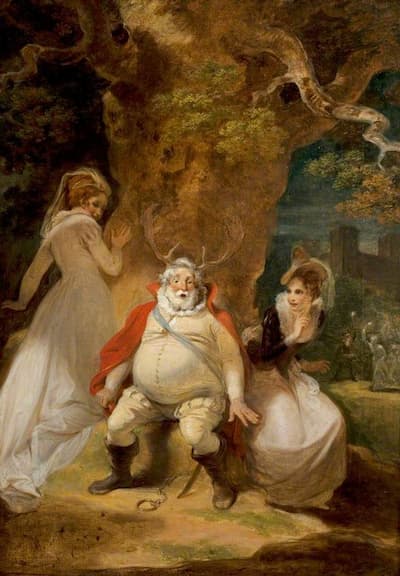
Robert Smirke: Fallstaff with his horns
Idiots and half-men, religious fanatics and social innocents – all have their place in the world of opera.
Thursday, August 4, 2022
Henry Mancini - Love Theme from "Sunflower(I Girasoli)" OST (1970)
I Girasoli (ひまわり/Sunflower) - Love theme from 'Sunflower'
Wednesday, August 3, 2022
‘Joseph the Dreamer’ opens two new shows
by Manila Bulletin Entertainment
‘Joseph The Dreamer‘
Trumpets has announced the addition of two new shows for the closing weekend to what is fast becoming a hit musical for 2022, “Joseph The Dreamer”.
“The audience demand for tickets has surged since the opening weekend, so we decided to open two new shows to give the audience more chances to watch the musical,” shared Butch Jimenez, Head of Trumpets.
“Joseph The Dreamer” chronicles the up and down life of the well-loved Biblical character, Joseph. It is an inspiring story of faith, forgiveness, family, and the sovereignty of God. It stars Sam Concepción as Joseph, Gary Valenciano as Jacob, and Kayla Rivera as Asanath. Alternates include Neo Rivera and Audie Gemora respectively.
The additional shows are scheduled for Aug. 6, Saturday, 3 pm and Aug. 7, Sunday, 8 pm at the Maybank Theater BGC. Tickets are available at Ticketworld 8891-9999.
.jpg)
.jpg)
